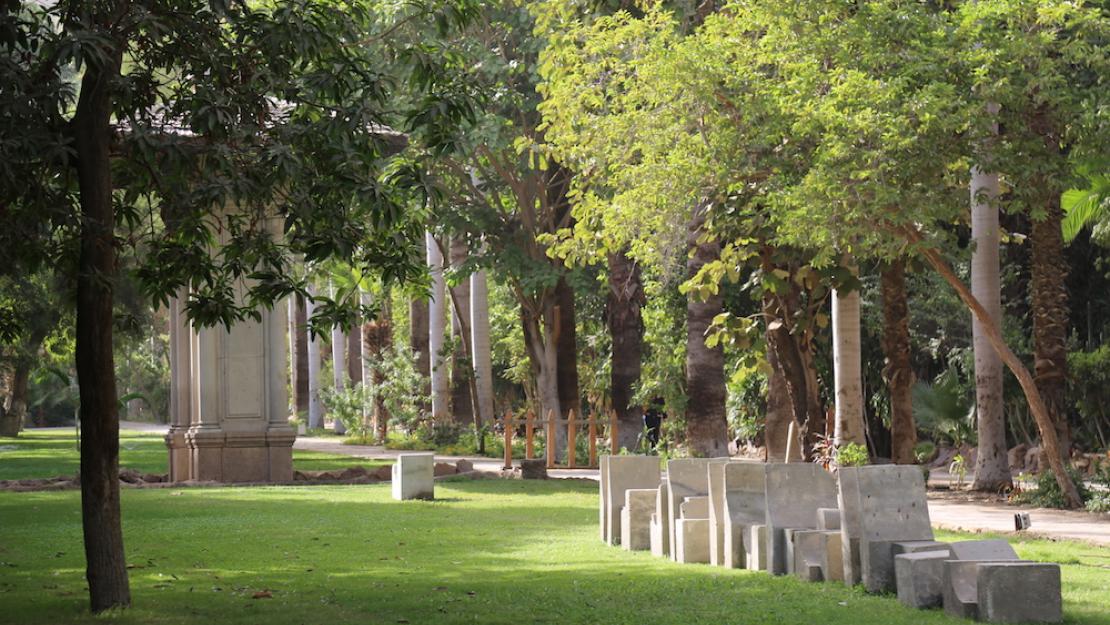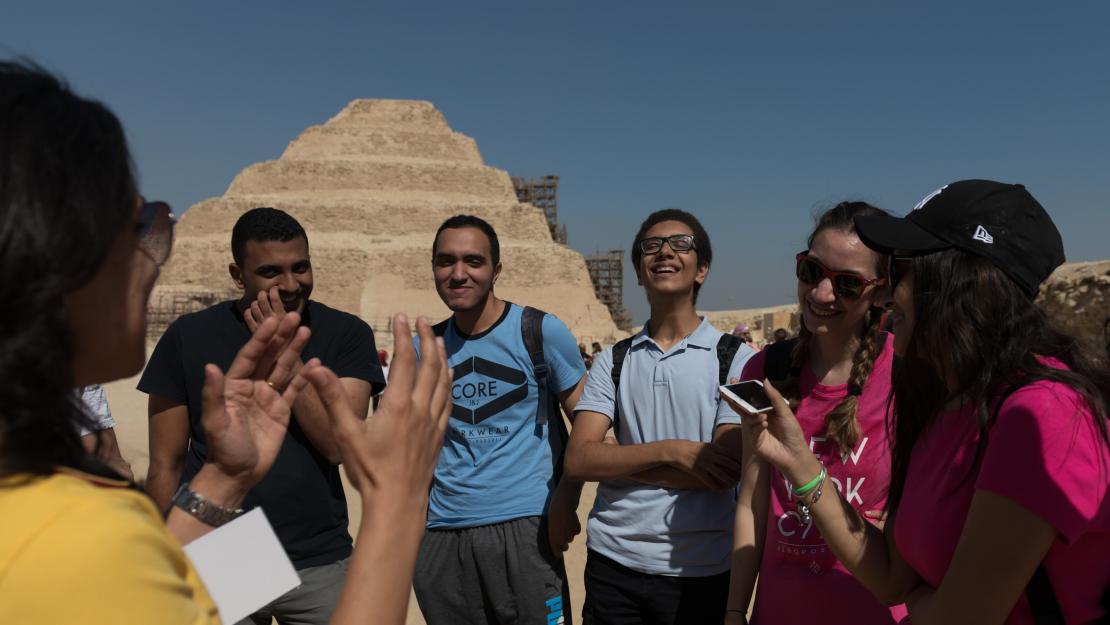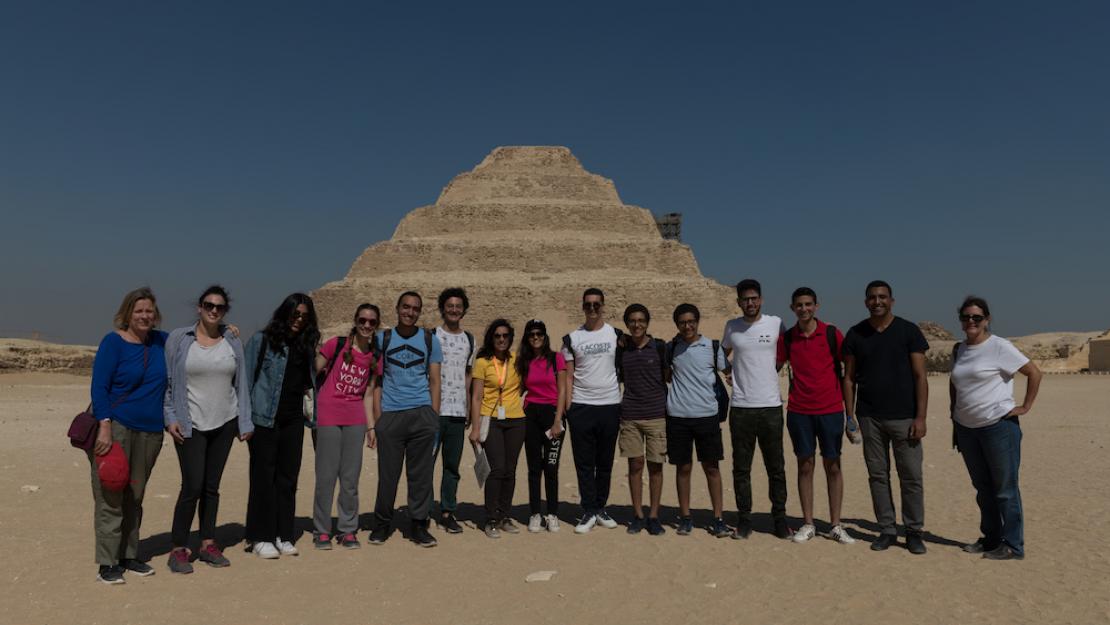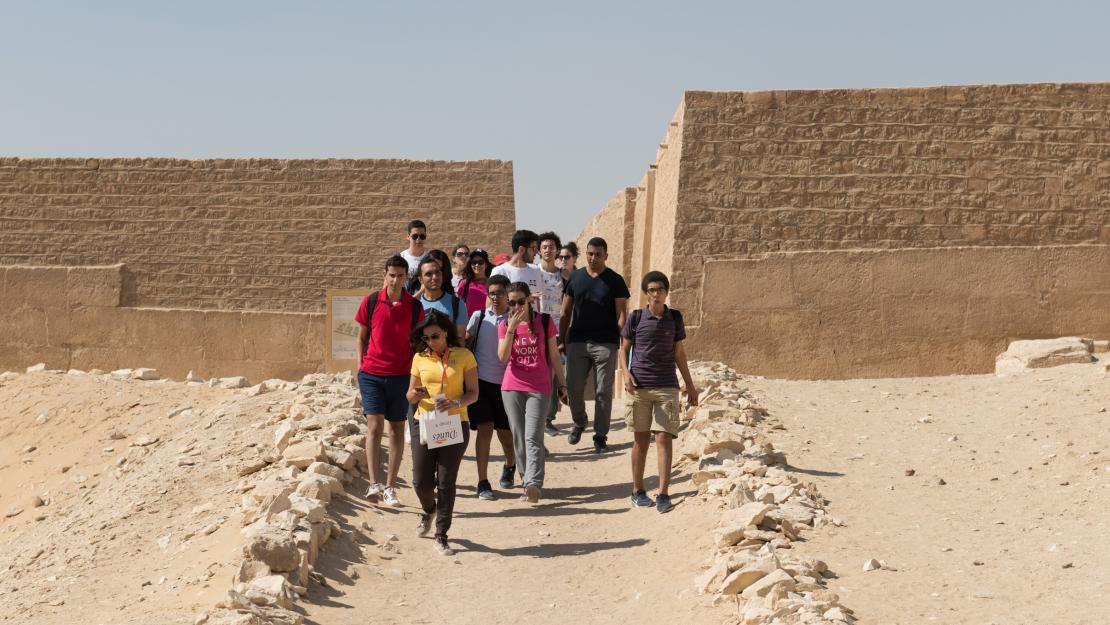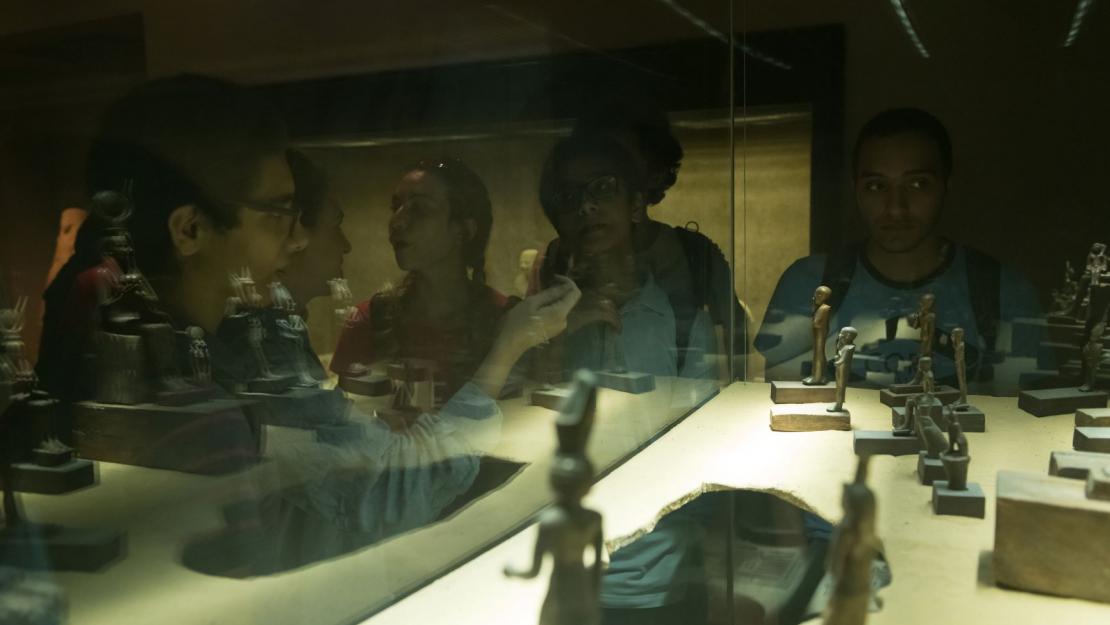 For a clinical psychologist, Kate Ellis, assistant professor of psychology, has a uniquely hands-off approach to therapy. In fact, she is trying to make the demand for traditional therapy as minimal as possible in Egypt.
For a clinical psychologist, Kate Ellis, assistant professor of psychology, has a uniquely hands-off approach to therapy. In fact, she is trying to make the demand for traditional therapy as minimal as possible in Egypt.
Why would Ellis want to reduce the need for therapy when she herself is a clinician? In a region filled with stigma and lack of resources, Ellis is on a mission to bridge the gap between available human resources and those that are needed to give young refugees and trauma survivors more accessible mental health resources.
“Though meeting face-to-face is ideal, it is often more realistic to provide a community with resources and training needed to be self-sufficient, like training non-professionals to help alleviate distress,” said Ellis, who also serves as both the graduate program director in the Department of Psychology and the coordinator of the leadership in mental health course held at AUC.
Hailing from the United Kingdom, Ellis accepted a postdoctoral position at AUC before she even finished her second PhD for a clinical doctorate in psychology. After arriving in Egypt, Ellis began focusing more of her time working with refugees and trauma survivors due to the large need in the region.
“I've always been interested in how violence and conflict affect people both in terms of victims and perpetrators, and what makes us inflict these things in other people, as well as how those consequences are understood and experienced by people,” she said.
Currently, Ellis is involved in projects to develop and evaluate intervention programs in conflict-affected settings such as Egypt, upscaling mental health interventions in low-economic countries and developing accessible online, culturally appropriate interventions for trauma in Egyptian Arabic.
“It is a very fascinating area of work and one that is very much under-filled in the Middle East,” said Ellis. “There is a lot of need here for understanding mental health needs, what can be utilized and what isn't here that needs to be built.”
Through multiple projects, Ellis has become a pioneer in delivering new resources to a region that requires ingenuity to produce results.
Looking Back to Move Forward
While the most serious mental health cases should be directed to therapeutic resources whenever possible, Ellis said mental health problems or distress of a less serious nature can often be managed with psychoeducation, social support and a healthy lifestyle. According to Ellis, there is a movement for professionally trained clinicians in the region to train and supervise others, perhaps seeing fewer clients themselves.
“There will never be enough clinicians to provide therapy to all those in need, especially in a country or a region that has suffered many wars, and as a result currently has the largest refugee crisis in history," Ellis explained. "In many cases, a highly skilled expensive professional is not needed.”
Ellis recently completed a study training lay counselors from a Sudanese refugee population to deliver narrative exposure therapy within their community. This type of therapy does not need to be delivered by a professional and is usually delivered over just five or six sessions, which makes it an ideal therapy program for refugees who are often moving frequently.
“I wanted the therapy to be delivered to people from someone who is from their culture, who understands it, who has the same language, from the same tribe,” said Ellis.
In the initial session, the participant creates a "lifeline." They take a long piece of rope and small stones and flowers and map out all the significant events in their lives. For every sad event, a stone is placed, and for every happy event, a flower is placed. The participants are then asked about their hopes for the next five years. Throughout the following sessions, each life event is discussed. As details emerge, more events are added, allowing the participant to discuss each event in-depth throughout the sessions.
“The idea is that building the narrative and the story and talking about it over and over again with someone who is non-judgemental and supportive helps the participant to go through their past in a way that becomes less painful and scary for them,” Ellis said.
She noted that during implementation, she spoke with the community about things like social cohesion, feeling like belonging and coming together. As the therapy was being distributed, Ellis noticed refugees started coming to their community center and gathering together.
“I'd see them having tea together,” said Ellis. “I think that feeling valued was a really helpful part of it because they often hadn't felt that before.”
Other benefits of the therapy are that it gives refugees documentation that they can take with them when they are trying to get registered as a refugee or get settled somewhere, Ellis noted. The style of the therapy also helps to avoid the typical stigma against mental health.
“I think in this region culturally, narratives and storytelling are something that most people feel quite comfortable with, so certainly, the Sudanese culture fits very well,” Ellis said. “Telling stories is an acceptable way to talk about things. It's culturally appropriate.”
Though she is still waiting to publish the official study, Ellis said that in all but one participant, symptoms of post-traumatic stress, anxiety and depression significantly decreased. When she interviewed the participants for feedback, a recurring theme was that it was the first time they had ever been heard and that being able to speak about it was empowering.
“The study shows us that it's not about doing complicated therapy and needing professional psychologists or psychiatrists,” Ellis said. “These are normal people from that population who were trained in a relatively short space of time on how to do this. It's really about being heard and having a safe space.”
Mobilizing Mental Health
In a country that is lacking in mental health resources, Ellis noted, how do you keep up? She turned to online intervention in hopes of reaching a broader spectrum of people.
“[Online resources] get around stigma and financial barriers," she said. "The fact that you can do it whenever you want, on your own time, in your house, on your phone, wherever you are — it's really helpful, especially in Cairo. As a clinician, I sometimes have people waiting in two hours of traffic to get to me for an appointment.”
Through a study on the development of a free online application that follows cognitive behavioral therapy principles, Ellis and her colleague Laura Miller-Graff of the University of Notre Dame have adapted an existing intervention into a culturally appropriate program in Egyptian-Arabic — the first online Arabic intervention for post-traumatic stress disorder. The app contains 17 different tools the user can work on that help manage PTSD symptoms like anger, anxiety and sleep problems.
“Online interventions are really becoming an important tool for mental health,” said Ellis. “That's not to say that we should remove therapists — I wouldn't want to do that myself — but it is not feasible or accessible for everyone to be able to see a therapist."
Ellis said that there were two main aspects to tackle in creating the app: translation into Arabic and making it culturally appropriate.
“There is not a one-size-fits-all Arabic, so we had to do many focus groups and studies,” said Ellis. “The first translation was an absolute disaster. The terminology does not translate easily, and it was just too difficult for people to understand. The second time, we took a lot more advice and guidance in developing it.”
Ellis said making it culturally appropriate involved working with a lot of different people during the development phase. The target group was Egyptians between 18 and 40. The entire process took two years and is currently halfway through the pilot randomized control trial of 100 Egyptians undergoing the intervention. The first wave of data arrives next month, and the results will be published after. Once it is finalized, her team will be looking to get more funding to roll it out on a much larger scale.
“One of the problems with doing cultural research is that it's very difficult to determine who this is accessible to,” said Ellis. “Our thoughts at the moment are those who have at least finished high school or basic college. Ultimately, I would love to do a version of this that is all audio for people with literacy issues.”
Initially, Ellis said they were worried about not getting enough referrals for the study due to issues of stigma. They put the trial on a few social media platforms. For every post, they received more than 100 calls and emails.
“It just shows that the demand is massive,” Ellis said. “We've had people who have come to us and ask if we can translate this into other dialects of Arabic and create this for refugees. We truly hope so, but we must finish this first. it's been a long journey, and we're really excited now.”
Breaking Barriers
One of the biggest challenges Ellis continuously faces is the stigma of mental health, which she says is especially strong in the Middle East.
"People understand that they can be impacted by traumatic events and there are things that can help them, but a lot of people won't go to a psychologist or a psychotherapist or even to their doctor, because of the stigma attached to it,” said Ellis. “We have a lot of people, particularly who are victims of sexual assault and harassment who would not dream of going and asking for help because they end up getting re-traumatized in the process and sometimes blamed.”
This is one of the major reasons Ellis says she has become interested in bringing more accessible mental health solutions to the region.
“Mobile mental health is one of the biggest areas of development worldwide at the moment,” Ellis noted. “There is also a huge increase in the number of mobile phones these days, which is making it more possible to do those kinds of things.”
Ellis is also a member of the University of California Davis Arab Region Consortium, a group of academics from universities in the United States, Egypt, Lebanon and Palestine. They are currently working on developing a tool and investigating training needs in the region for professionals, paraprofessionals and non-professionals as to what's needed to help manage the mental health needs of refugees. This is part of a wider project for transforming refugee mental health care in the Middle East.
Making Connections
For the past four years, Ellis has been the coordinator of a leadership in mental health course for the Eastern Mediterranean region in partnership with the World Health Organization. The World Health Organization approached the Department of Psychology about this partnership. Departmental faculty and international experts, as well as the Egyptian General Secretariat, collaborated with them in developing the course structure and curriculum. The 10-day intensive training course is held annually at AUC, bringing mental health professionals from all over the region to learn how to lead in mental health in the region.
“We have an online network so participants can stay in touch and continue to network with each other [after the course], and it's really nice to see that the sharing of information continues," she said. "Knowing they have that as a resource that is so missing in this region is a great feeling and one we are proud of in the department.”
Ellis and her colleague Carie Forden, also a professor in the Department of Psychology, have written and recently submitted a paper for peer review, evaluating how participants have experienced the program and what they've gone and done after to see if they are implementing the ideas they’ve learned.
“What's great is they're actually making changes in policy; they're actually recruiting mental health professionals,” she said. “In an interview that we just did, someone told us how they didn't even have a mental health budget and now they have one and have increased it -- and that they're doing training based on the things they have learned.”
AUC and Beyond
In her journey to create more accessible mental health resources in Egypt and the Middle East, Ellis said it is encouraging to see the dialogue around mental health changing.
“So many more people are more open to hearing about [mental health] and understanding it,” said Ellis. “I first started coming to Egypt 10 years ago for vacations. I never thought I would be working here, teaching counseling psychology to graduate students, seeing clients for therapy and seeing so many developments in the field."
Ellis mentioned that she is very fortunate to work with a talented and varied faculty in the Department of Psychology. The last five years at AUC, she indicated, have opened the doors to and provided the chance to collaborate on innovative projects locally and internationally in an area of huge development, which has been and continues to be a great privilege.
"So many of our graduates from the counseling and community psychology master's programs are doing wonderful things and providing mental health services and awareness in an ethical and professional manner to the Egyptian population, both in the public and private sector and also in NGOs,” said Ellis. “They are real innovators and ambassadors in the field, creating dialogue, dispelling myths and developing new services here in Egypt.”
Though Ellis admits there is a very long way to go in delivering mental health resources — whether they are mobile or face-to-face services and to overcome stigma — the work of many passionate and skilled psychologists in the country toward making mental health more accessible has fueled a conversation that is continuing to grow.











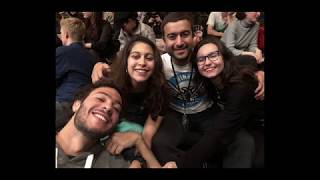


















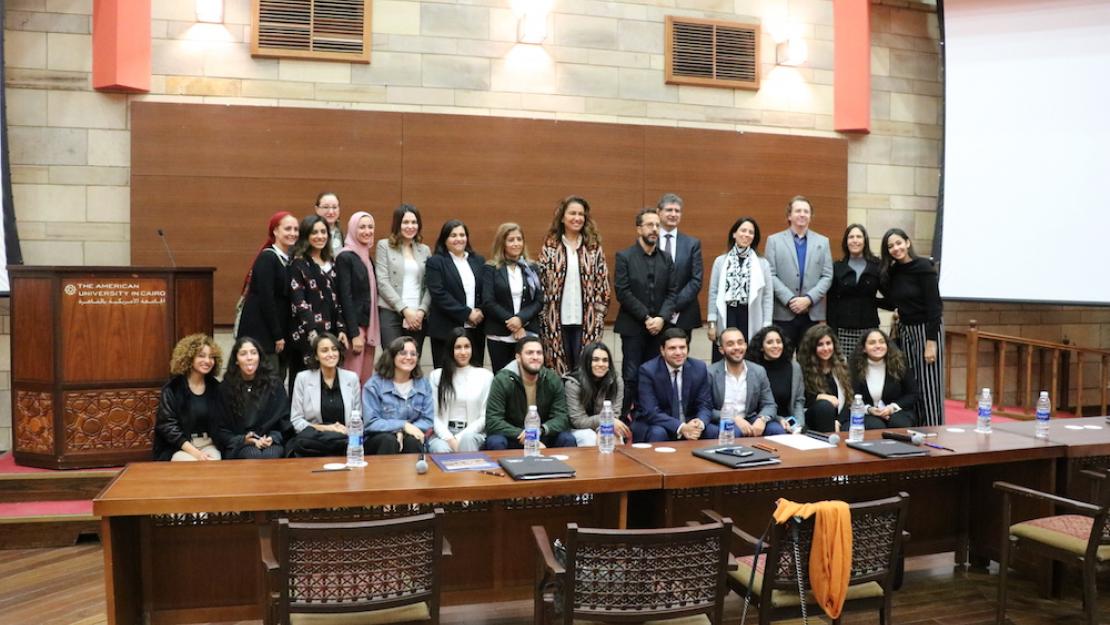






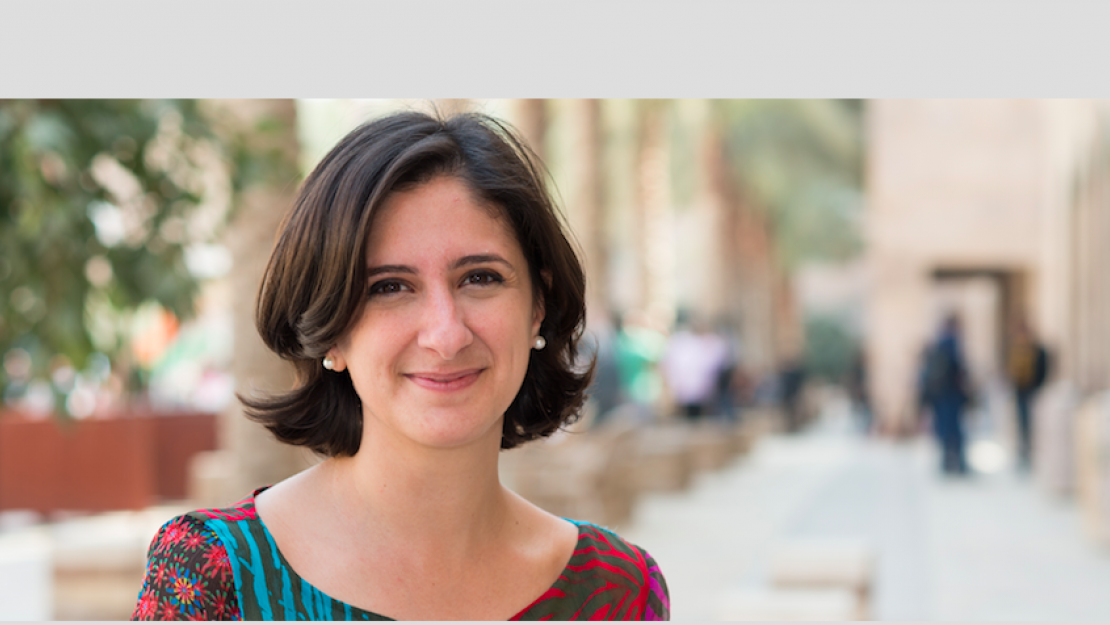


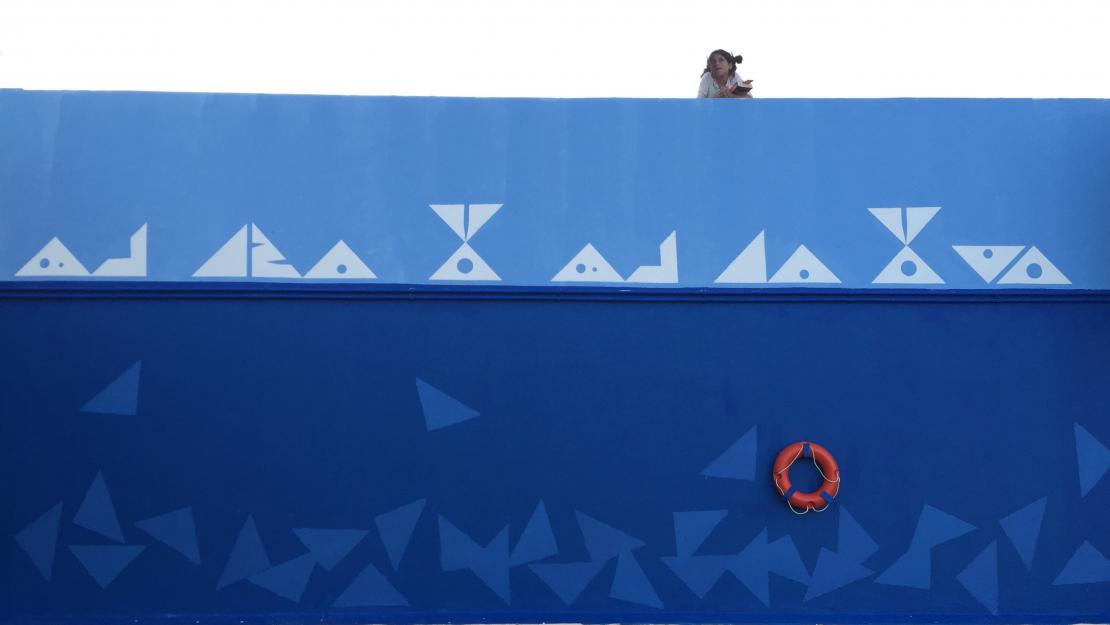



 For a clinical psychologist, Kate Ellis, assistant professor of psychology, has a uniquely hands-off approach to therapy. In fact, she is trying to make the demand for traditional therapy as minimal as possible in Egypt.
For a clinical psychologist, Kate Ellis, assistant professor of psychology, has a uniquely hands-off approach to therapy. In fact, she is trying to make the demand for traditional therapy as minimal as possible in Egypt. 

